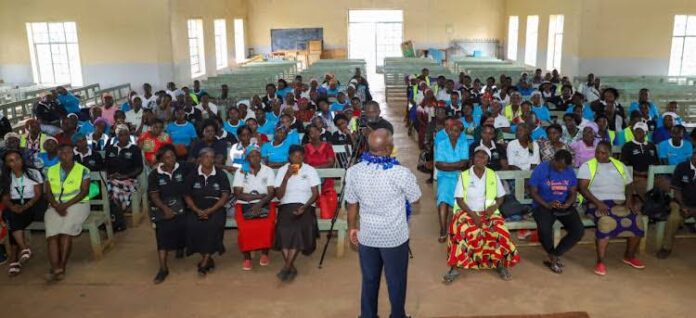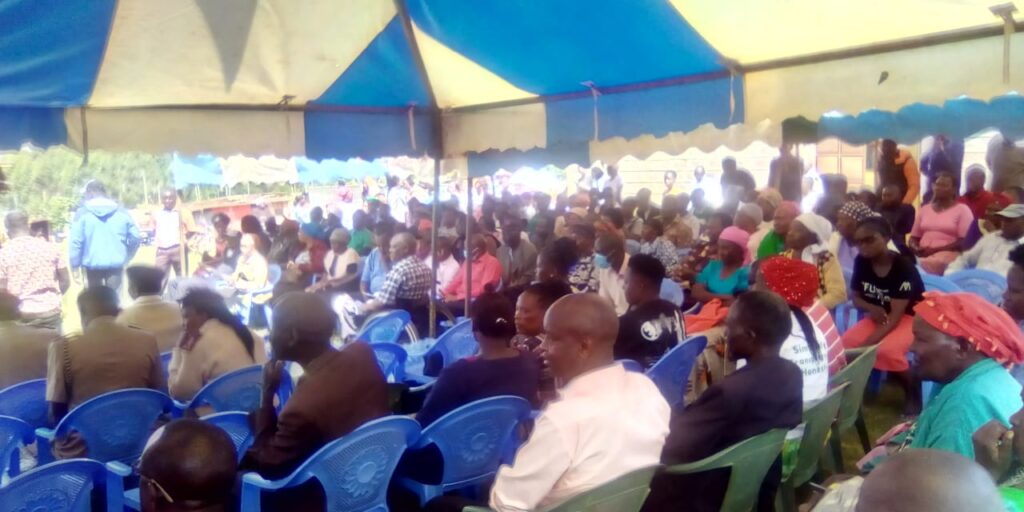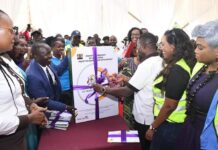
By Sefu Sabila, DevReporter, Trans Nzoia

Community Health Volunteers (CHVs), commonly known as Madaktari wa Vijiji, are important stakeholders in the achievement of Universal Health Coverage (UHC) in the country. Despite their great contribution to the health sector, their efforts have not been recognised in most counties in Kenya.
The volunteers are the first line of caregivers in the community, and they also steer the UHC. According to Jane Mwenjwe, a Public Health Officer (PHO) at Tom Mboya health facility in Tuwan ward, Saboti constituency, CHVs are important persons in building a healthy nation.
“We have been working with CHVs for a very long time on a voluntary basis. We work with them in activities like deworming, door-to-door vitamin A administration, and immunisation awareness, but they are just paid a stipend thereafter,” she explains.
Duties of CHVs
This “neglected” group in the health sector carryout duties, which include:
- Creating connections between vulnerable populations and health providers,
- Ensuring residents have access to clean water,
- Providing informal counselling and health screening and referrals,
- Educating healthcare providers and stakeholders on the needs and gaps in the health of the communities in which they operate. This is intended to increase their capacity to address health issues.
A Stitch on Time
Agnes Kirigo, a CHV in Tuwan ward, who is a religious leader with no other income, says that they have turned into caregivers for vulnerable community members, and that for her, she often has to dig down into her pockets to provide for some of the vulnerable people in her ward.
“As we go round when creating awareness, say on an up-coming camp or clinic, we meet many needy Kenyans. Their first need is food before taking them to the hospitals. This, however, often require buying them food and providing them with money for transport, and this is a challenge,” Agnes explains.
The Tom Mboya health facility provides the CHVs with basic tools for introduction and registration, in a process intended to provide health stakeholders within a given locality, with important and relevant data on valuable communities.
According to Jane Mwenjwe, the information provided by CHVs aids the process of checking and knowing where there is need for immediate or more awareness creation within the area. She, however, decried the challenges they face when their monthly stipends go unpaid.
“We have provided them with MOH 513 and 514 for households’ registration and summary report within their areas. This information is combined by medical officers in their offices in MOH 515,” she explained.
“It is from their reports that we can see for instance how many women are expectant, the immunisation graph in the ward and also, a possible outbreak of diseases within the ward. It is also from the data that we are able to identity gaps and needs in the society,” she added.

During the community Baraza held for residents of Mti Moja within Tuwan ward, peace ambassador and a member of Persons With Disability (PWDs) in Trans Nzoia, George Barasa, commended the CHVs for bringing out children with disabilities who are often hidden by their parents. He also appreciated CHVs efforts in linking the vulnerable groups to opportunities and health camps in the area.
Further, to reinforce the workflow of CHVs, on 10th of June 2023, health Cabinet Secretary Susan Nakhumicha said that the ministry would provide technological tools to enhance their work to over 100 households. This is as calls to county governments to implement the proposed stipend for the volunteers, continues.
Challenges
Molly, also a CHV within Tuwan ward, says that frustrations and lack of interest by some of the staff in the hospitals in the area demotivates the volunteers. According to her, some officials in some government health facilities pocket the little appreciation in the form of stipends set aside for them and this is the reason she says that she prefers to work with international organisations.
“Working with international organisations like Academic Model Providing Access to Healthcare (Ampath) is smooth and more encouraging. For example, once you deliver a client, Marie Stopes used to make payment of Khs. 500 per a client. In government facilities, corrupt individuals take the little money set aside for CHVs,” she said.
Agreeing with her colleagues, Agnes says many facilities take them for granted despite them being volunteers and hence work willingly. As a result, many volunteers have withdrawn from offering their noble services.
PHO Jane Mwenjwe says she works with 10 community units, which consist of 10 CHVs in Tuwan ward, with only 5 volunteers trained. Other challenges she highlighted include:
- Voluntary working means working within their terms, which poses delays to some of the activities,
- Lack of funds to train more volunteers,
- Some of the volunteers fail to observe confidentiality of patients’ data,
- Community members being reluctant since the volunteers are not actual medics,
- Low turnout of volunteers for the monthly meetings because it is voluntary work.
However, Mrs. Mwenjwe adds that Ampath increased their stipend from previously Ksh. 300 to Ksh. 550. It has also further complemented government efforts by training CHVs in 2022 together with other Non-Governmental Organisations.
Proposed Bill
Mrs. Mwenjwe also proposes to the county government of Trans Nzoia to provide stipend for CHVs in the county. She also urged the County to set aside a budget for volunteers.
In 2020, a former Orange Democratic Movement party nominated senator proposed a bill to provide a legal framework for improved, adequate, as well as quality health delivery to all Kenyans.
Recently during an interview with a local television, National Assembly deputy speaker Hon. Gladys Boss reiterated on the need for County Assemblies to enact the bill to provide the necessary legal framework.
The bill has proposals on:
- Modes of selecting health volunteers,
- Institution of stipends for volunteers,
- Further training of community health volunteers.
Mrs. Mwenjwe further urged the county government to walk in the footsteps of the counties that have implemented the bill, such as Nairobi, Kajiado and Meru among others.
Other related stories
https://www.kenyanews.go.ke/community-health-volunteers-receive-stipends/





